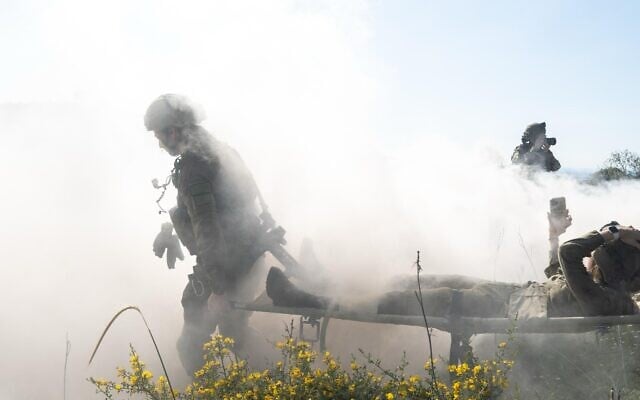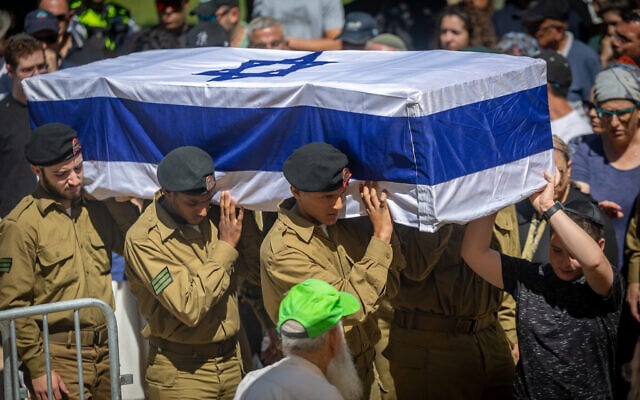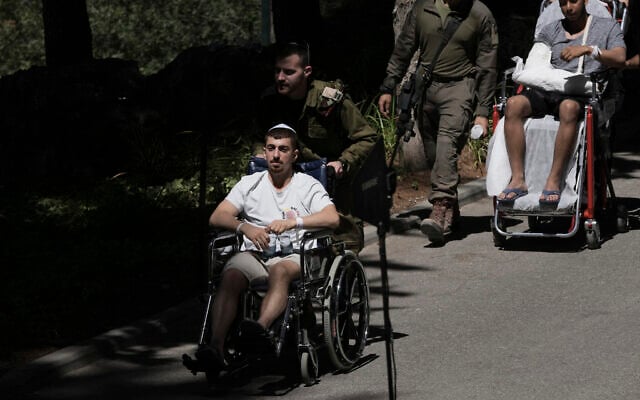 |
| WE DO NOT CARE:The challenges include “a shortage of staff, with a ratio of 1:750
patients per rehabilitation worker; the need to simplify bureaucracy;
and new and unique needs required for the newly wounded” |

More than 10,000 IDF soldiers have been treated for mental health issues since Oct. 7
Defense Ministry says 45% of 20,000 wounded
soldiers have physical injuries, 35% have PTSD or other mental ailments,
and 20% are suffering both physically and mentally
The Defense Ministry’s Rehabilitation Department said on Sunday
that it has treated some 20,000 wounded soldiers since the beginning of
the war on October 7, 2023, more than half of whom are suffering from
mental health conditions.
According to the Defense Ministry, some 56% of those treated by the
rehab centers amid the war are suffering from post-traumatic stress
disorder and other mental health conditions.
Some 9% of the wounded are defined as having moderate-to-severe
injuries; 56 soldiers are classified as having over 100% disability —
the most severe level of injury; 24 wounded have 100% disability; 16 of
those wounded are paralyzed; and 99 are amputees who received
prosthetics, the ministry said.
Each month, around 1,000 wounded soldiers from the war are treated by
the rehab department, in addition to around 600 requests from previous
wars.

Israeli soldiers wounded in the war
with Hamas walk in the rehabilitation division of Sheba Medical Center
in Ramat Gan
Including previous wars, the ministry said the rehab department is
caring for a total of 81,700 wounded veterans, including 31,000, or 38%,
suffering from mental health conditions. It forecasts that by 2028, the
center will be treating some 100,000, with at least half of them
suffering from PTSD and other mental health conditions.
The rehab department’s budget stands at NIS 8.3 billion ($2.5 billion),
NIS 4.1 billion of which is dedicated to treating those with mental
health conditions, the ministry said.
Officials at the rehab department say they have identified that “in
the coming years, alongside the national challenges of the increase in
the number of wounded, the continuation of the war, the treatment of
those dealing with mental health conditions, the concern about suicide,
and the shortage of therapists, there are challenges that require
immediate response.”
The challenges include “a shortage of staff, with a ratio of 1:750
patients per rehabilitation worker; the need to simplify bureaucracy;
and new and unique needs required for the newly wounded,” it said.
The Defense Ministry’s Rehabilitation Department said on Sunday
that it has treated some 20,000 wounded soldiers since the beginning of
the war on October 7, 2023, more than half of whom are suffering from
mental health conditions.
According to the Defense Ministry, some 56% of those treated by the
rehab centers amid the war are suffering from post-traumatic stress
disorder and other mental health conditions.
Some 9% of the wounded are defined as having moderate-to-severe
injuries; 56 soldiers are classified as having over 100% disability —
the most severe level of injury; 24 wounded have 100% disability; 16 of
those wounded are paralyzed; and 99 are amputees who received
prosthetics, the ministry said.
Each month, around 1,000 wounded soldiers from the war are treated by
the rehab department, in addition to around 600 requests from previous
wars.

Israeli soldiers wounded in the war
with Hamas walk in the rehabilitation division of Sheba Medical Center
in Ramat Gan
The rehab department’s budget stands at NIS 8.3 billion ($2.5
billion), NIS 4.1 billion of which is dedicated to treating those with
mental health conditions, the ministry said.
Officials at the rehab department say they have identified that “in
the coming years, alongside the national challenges of the increase in
the number of wounded, the continuation of the war, the treatment of
those dealing with mental health conditions, the concern about suicide,
and the shortage of therapists, there are challenges that require
immediate response.”
The challenges include “a shortage of staff, with a ratio of 1:750
patients per rehabilitation worker; the need to simplify bureaucracy;
and new and unique needs required for the newly wounded,” it said.

IDF troops simulate an aerial evacuation
of wounded soldiers near the West Bank city of Tulkarem, in images
cleared for publication on March 26, 2025. (Israel Defense Forces)
In light of the challenges, Defense Minister Israel Katz and Finance
Minister Betzalel Smotrich recently announced the establishment of a public committee
headed by Prof. Shlomo Mor-Yosef, chairman of Leumit Health Services,
to formulate recommendations on how to expand the treatment and
rehabilitation of wounded IDF soldiers.
The new initiative plans to examine and recommend improvements in key
areas, including recognition of wounded veterans, streamlining medical
and psychological rehabilitation, employment integration, family support
systems and allocation of budget and manpower resources.
Since the war began with the October 7, 2023, Hamas-led invasion, 904 IDF soldiers have been killed across the various arenas of conflict.
That figure includes 329 soldiers killed during the October 7 attack
and 460 during the ensuing ground operations in Gaza and amid operations
on the border. It also includes 29 soldiers killed in Hezbollah attacks
inside Israel, and 51 soldiers who were killed during ground operations
in Lebanon.
Two soldiers were killed in a drone attack from Iraq, and one soldier was killed in a ballistic missile attack from Iran.
The military’s list also includes a soldier killed by friendly fire
in the West Bank, a soldier killed due to malfunctioning ammunition on
the Lebanon border, two soldiers killed in a tank accident in northern
Israel, and a number of other deadly incidents amid the war that were
not directly related to the fighting.

Friends and family attend the funeral of
Sgt. Shlomo Yakir Shrem, who was killed during an Israeli military
operation in the Gaza Strip, at the military cemetery in Kfar Etzion,
July 15, 2025.
Twelve soldiers were killed in terror attacks in the West Bank and
Israel, and five soldiers were killed during counter-terrorism
operations in the West Bank.
https://www.timesofisrael.com/more-than-10000-idf-soldiers-have-been-treated-for-mental-health-issues-since-oct-7/?utm_source=The+Daily+Edition&utm_campaign=daily-edition-2025-09-14&utm_medium=email
























